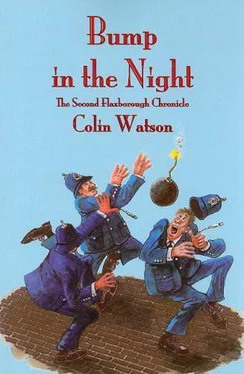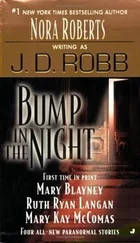“She was knocked down by a car, wasn’t she?”
“She was. And you can guess the name of the driver.”
“Biggadyke.” Purbright saw no reason to point out that he was not guessing.
Larch nodded and stared past him as if looking at a now familiar ghost that he had given up trying to exorcise. “We did our best with a manslaughter charge—that was before the new Act, of course—but it didn’t stick. He was very lucky.”
“Luckier than Celia.”
Larch flicked at him his cold, sad glance. “As you say, Mr Purbright: luckier than Celia.”
“And what,” Mr Kebble put in, “are you going to do now?” He was beginning to find oppressive the towering proximity of the two men carrying on their conversation over his head.
“Will Grope still be over at the cinema?” Larch asked him.
“He should be.”
Kebble watched the policemen go. Larch’s purposeful stride took him first to the door. He looked, the editor reflected, like an executioner. Following at a stroll, Purbright turned and smiled. “Thanks for the coffee, Mr Kebble.”
The editor smiled weakly and raised his hand. Then his attention was caught by Leaper holding aloft a book and gesticulating. “Oh, Mr Purbright!” he called. The inspector came back to the counter.
“I forgot to tell you,” said Kebble, handing him the book, “that Leonard’s tracked the other half of that quotation.”
“Has he now.” Purbright beamed at the youth. “Smart work, Mr Leaper; smart work indeed!” He nearly added ’The Commissioner shall hear of this’ but refrained on catching an agonized look from Kebble and the murmured warning: “No praise, old chap. Like firewater to an Indian. Queer lad.”
The foyer of the cinema was empty. Shafts of sunlight, aswarm with dancing dust motes, slanted from the side windows upon the plastic stucco and struck back a chilly, colour-drained gleam. Where they fell across the carpet, the golden patches were scabbed with innumerable lozenges of blackened, trodden-in chewing gum. There was a smell of ashtrays and vitiated deodorant. Above the whine of a distant vacuum cleaner rose occasionally the cackle of ladies making discoveries under seats.
Larch pulled one of the auditorium doors slightly open and peered through. “Grope’s there now,” he said to Purbright, “but I’d like to get a few things straight before we have a word with him.”
They sat on the outskirts of an enormous chesterfield.
“I suppose,” Larch began, “that you’re satisfied that whoever sent in that piece of poetry meant it as a hint that Stan Biggadyke had something coming to him?”
Purbright did not answer immediately. He opened the book that Kebble had handed him, found the turned down page, and read a couple of verses to himself.
“Are you familiar,” he then asked Larch, “with the works of Emily Dickinson?”
His companion accepted the question as purely rhetorical and began picking his teeth.
“She wrote, among other things,” Purbright explained, “a poem piquantly entitled ‘There’s Been a Death’. The last line of the penultimate verse, together with the whole final verse, read like this:
“ ’There’ll be that dark parade
Of tassels and of coaches soon;
It’s easy as a sign—
The intuition of the news
In just a country town’ ”
Larch disengaged his matchstick. “Tassels and coaches...a funeral, of course.”
“Obviously.”
“Dark parade...I like that bit. Very neatly put.” He frowned. “But you’ve read out more than there was on the newspaper cutting. Has that crook Kebble been snipping at it, do you think?”
“Of course not.” Purbright felt a little impatient with Larch’s extravagant view of the criminal propensities of his fellow citizens. Apart from the likelihood of its being fatuous and unjust, it kept the field of suspects disconcertingly packed.
“No, the quotation in the paper ended with ‘easy as a sign’ so that there would be a final rhyme with ‘divine’. You remember the first part—‘The thirst that from the soul doth rise doth ask a drink divine’—the object of that was twofold. It hinted strongly at vengeance, as Kebble noticed, and it subtly identified the person whose death was to be avenged. Ben Jonson’s dedication was ‘To Celia’. Our murderer’s dedication was to a girl with the same name. Quite clearly, this Grope female.
“Now, then...”—Purbright tapped the open page—“The lines of Emily Dickinson that have been so oddly welded to those of Mr Jonson complete the story. It’s been most admirably done, you know. Especially, I think, the omission of Miss Dickinson’s last two lines.”
“You said that was just to get a rhyme,” Larch pointed out.
“Primarily, yes. But the force of a quotation is immensely increased when it is partly submerged, so to speak. Lawyers, you’ll notice, never quote their Latin tags in full. Tempora mutantur, m’lud...hrrm, hrrm, careless wave of the hand, judge flattered, case dismissed—you know the sort of thing. But that’s very ordinary stuff. Look at what’s been left unsaid here...‘the intuition of the news in just a country town’. It sums up the whole purpose of this extraordinary notice. Yet the murderer has had the subtlety—and self control—to hide the crux of his message from all but the kind of person who likes to grapple with intellectual literary competitions. He must have an extremely rarefied sense of drama. If this is a symptom of criminal vanity, I’m inclined to think he has something to be vain about.”
Larch gazed at a morticianly tinted portrait of Ramon Navarro on the opposite wall. “It sounds like one of our culture birds to me,” he observed. “I told you they were the ones to watch. Hoole was my bet, as I told you, but I suppose Grope’s odds-on favourite now.”
“Is he cultured?” Purbright asked doubtfully.
Larch snorted. “He’s Chalmsbury’s poet bloody laureate. What more do you want?”
“I didn’t think Mr Grope’s poetry was quite in the same category as the stuff we’ve been talking about. Still, he probably has a fairly catholic taste.”
“You know he writes those ‘In Memoriams’ for the paper, don’t you?”
“So I’ve been told.”
“Don’t you think, then, that when he set out to do a crafty one for poor old Stan he’d deliberately disguise his style? It strikes me that the simplest way of doing that would have been to pick up a few lines written by one or two other people and mix them up.”
“It’s conceivable.”
Larch shrugged. “Well, then; that’s obviously what he did. The rest ties up. He’s the father of the girl Stan killed. The accident probably tipped his nut and he’s been scheming ever since to take revenge. The anniversary of her death would be just the day.”
“The motive’s strong enough,” Purbright agreed. “What about opportunity?”
“Grope had that, all right. He hangs on here until all sorts of odd times. I’ve known him sleep all night in one of the seats. He could easily have slipped out to that caravan, got the window open as you suggested, popped the bomb inside and scarpered without anyone being the wiser. His old woman doesn’t keep tabs on him.”
“And the earlier explosions?”
Larch considered. “Aye, well I suppose he must have worked those too. The same argument applies, though. Grope always had a good excuse for being out at night.”
Cradling his shins in clasped hands, Purbright drew up his knees and pensively rested his chin upon them. When again he began to speak, his voice was flattened by the posture and Larch had to bend forward to catch what he said.
“The idea of setting off a chain of explosions in the form of practical jokes for which Biggadyke might be blamed was clever. It had precisely the intended effect. A good many minds were already made up by the time the last explosion was fixed—the only one that really mattered. Even the coroner, who’s no fool, was prepared to assume what the murderer intended him to assume. It’s important, I think, to grasp that planning of this order indicated an altogether exceptional mind. Unless we do, we might easily fall into whatever second or third line traps that so gifted a gentleman would undoubtedy have devised.”
Читать дальше












